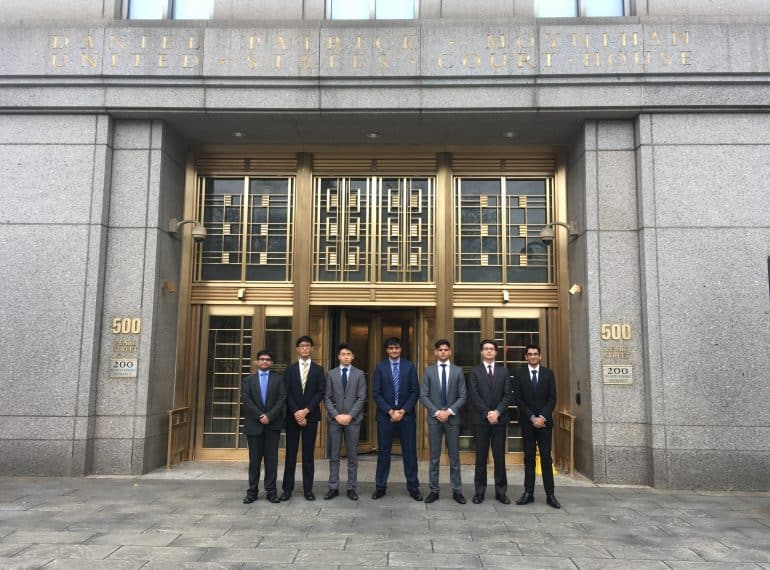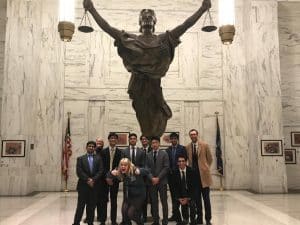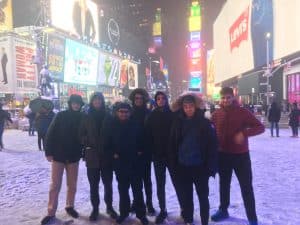
For the first time ever, a QE team qualified for the prestigious Empire Mock Trial competition in New York, where they pitted their legal knowledge and courtroom acumen against some of the world’s finest young debaters.
The seven-strong Sixth Form team won their place after QE’s strong performance in the national finals in the UK Bar Mock Trial competition last academic year.
In New York XII (other Empire Mock Trial events are held in San Francisco and Atlanta), the QE boys achieved very close results against all the schools they faced and won one case, although the team was not among the overall winners. Most of the competing schools were from the USA. Empire Mock Trial also invites teams with a proven record of success from Australia, Canada, Ireland, South Korea and the UK to take part.
Congratulating the seven on their trail-blazing achievement, Headmaster Neil Enright said: “This was a very exciting opportunity for the boys involved and I know they seized the chance to interact with gifted young people from the US. Their success will no doubt inspire and motivate those in this year’s UK competition to give of their best and attempt to reach a similar stage again.”
 Academic Enrichment Tutor Lucy Riseborough said the competition was a test of both ability and mental stamina. “Whilst similar to the UK version and drawing on similar skills (such as analysing and synthesising information, developing lines of questioning and argument, applying legal principles, learning procedures, effective communication and oracy) the Empire Mock Trial is based on the US courts system. The boys not only had to grapple with case files running to hundreds of pages (witness statements ran to 3,000 words each), but had to learn the different ‘objections’ to utilise (and defend themselves against) in the courtroom. With the ability of attorneys to choose which witnesses are called, the boys had to learn and prepare a lot of information that they would not, in fact, end up using; selecting the right information to deploy, and when, was therefore crucial.
Academic Enrichment Tutor Lucy Riseborough said the competition was a test of both ability and mental stamina. “Whilst similar to the UK version and drawing on similar skills (such as analysing and synthesising information, developing lines of questioning and argument, applying legal principles, learning procedures, effective communication and oracy) the Empire Mock Trial is based on the US courts system. The boys not only had to grapple with case files running to hundreds of pages (witness statements ran to 3,000 words each), but had to learn the different ‘objections’ to utilise (and defend themselves against) in the courtroom. With the ability of attorneys to choose which witnesses are called, the boys had to learn and prepare a lot of information that they would not, in fact, end up using; selecting the right information to deploy, and when, was therefore crucial.
“Each trial lasted about three hours and they were very ‘full-on’ – the boys had to be constantly thinking on their feet in challenging circumstances.
“More importantly, though, in many ways was the fact that the boys formed friendships and met lovely people from other countries – really benefiting from working with those from different educational and cultural backgrounds.”
The QE team were: Kieran Dhrona, Haider Jabir, Viraj Mehta and Saifullah Shah, all of Year 12, and Year 13’s Nathan Chu, Mipham Samtem, and Anake Singh.
Their preparations prior to flying to the US included a session alongside Chelmsford Girls’ Grammar School, during which lawyers advocated being bold with the use of objections.
Within the QE team there were four attorneys and three witnesses. The attorneys all both prosecuted and defended (depending on which side of the case QE had been allocated) and shared each case out between them.
“We faced four different schools across the competition, with incredibly close results in all of them – including against the American schools much more familiar with the particulars of the format,” said Miss Riseborough. “QE won the final case, with a very strong defence team – Mipham Samtem even managing to quote from The Great Gatsby when in full flow – although they were, in fact, praised by the judges throughout, with them commenting that they would never have known they were from a non-American school, such was their knowledge and grip on the procedures of the US court format.”
The case the trials dealt with was set in a fictional state called ‘Empirion’ and involved a hate crime against a member of the native people called ‘Empirions’. There was a protest by the Empirions who wanted a colonial statue taken down, with a counter-demonstration taking place by those arguing it should remain. Harry, an Empirion, approached Tommy Abel (member of the counter-demonstration), who was shouting offensive slogans through a loud-hailer. An incident occurred which led to Harry being hit with the loud-hailer and then supposedly kicked when on the ground. Tommy’s defence was that he had acted in self-defence initially, and he denied then kicking Harry when the latter was on the ground.
The case touched on the complexities around self-defence arguments, as well as on topical societal issues in relation to free speech and hate crimes. “There is, of course, a movement on both sides of the Atlantic arguing for the removal of supposedly colonialist symbols – such as the ‘Rhodes must fall’ campaign begun in Oxford – with the issues much-debated and hotly-contested,” said Miss Riseborough.
As well as arguing the substantive charges, there were side debates (a pre-trial oral debate with the judge) around First Amendment rights. The judges were typically experienced attorneys.
 During their trip, the QE boys took the opportunity to do some sight-seeing, notwithstanding the freezing temperatures and the snow that heralded their arrival. After dinner on the first evening, they went to Times Square, whilst the following morning they walked around Central Park in the snow. On the last day they went up the Empire State building to take in the view and also visited Grand Central Station.
During their trip, the QE boys took the opportunity to do some sight-seeing, notwithstanding the freezing temperatures and the snow that heralded their arrival. After dinner on the first evening, they went to Times Square, whilst the following morning they walked around Central Park in the snow. On the last day they went up the Empire State building to take in the view and also visited Grand Central Station.
Reflecting on the experience afterwards, Mipham said: “The Empire competition is a truly international experience that all the members of our team greatly enjoyed and were honoured to be a part of. We felt we represented what Britain has to offer on the world stage: confident, capable individuals with open minds and buckets of enthusiasm.”
His teammate, Saifullah, added: “Empire afforded us both the chance to sharpen our legal acumen within the courtroom and to expand our horizons outside of it. It was a truly pleasant experience to compete on an international stage and share thoughts with fellow students from all around the world. We would like to give a special thanks to Wando High School from South Carolina, who were exceedingly kind to us throughout the competition.”
